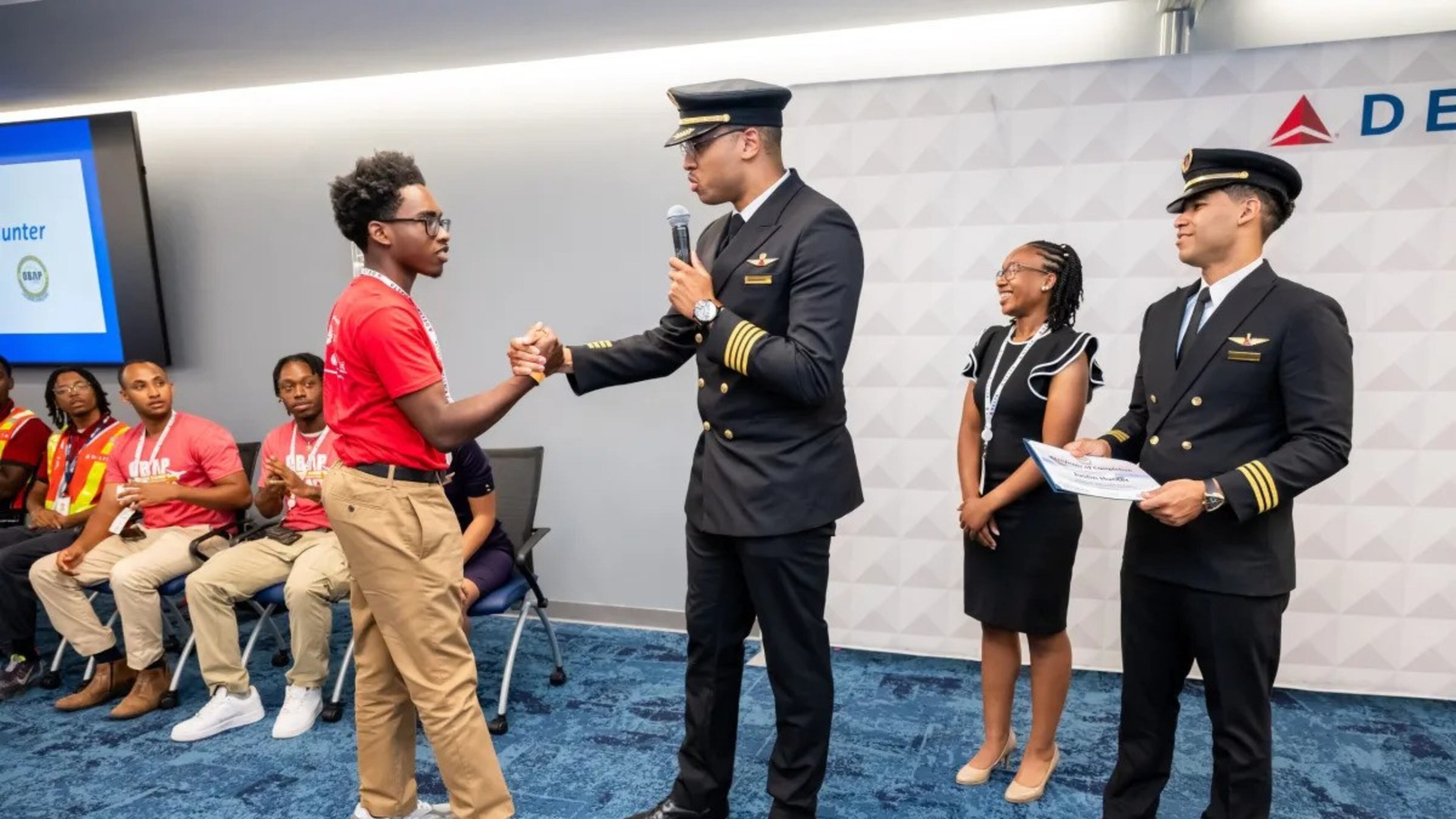The push for more Black pilots gets federal funding boost

Justin Mutawassim’s dream of becoming a pilot took flight 22 years ago when, at age 5, he stepped on a plane for the first time during a family trip to Disney World.
“I just had a fascination with the airplane itself and how it flew,” Mutawassim recalled in a recent phone interview.That fascination took hold. Today, the Atlanta resident is a pilot for Delta Air Lines, a career opportunity that has elevated his economic prospects. At 27, he says he’s on track to make about $500,000 this year. It’s a big take for a relatively young pilot, but Delta isn’t only paying him to fly.
The company also pays Mutawassim to support some of its pilot recruiting initiatives, including its Propel Pilot Career Path Program and its partnership with the Organization of Black Aerospace Professionals, an advocacy group working to increase minority participation in the industry.
“I work quite a bit,” Mutawassim said.
Mutawassim’s high-flying career highlights one of his industry’s biggest challenges and a potentially huge opportunity for workers looking to expand their options. As many of his fellow Black Georgians search for better-paying jobs to keep up with the rising cost of living, airlines are working to hire more people of color in high-paying aviation careers, including mechanics, air traffic controllers, and especially pilots.
The Federal Aviation Administration Reauthorization Act, signed into law by President Joe Biden in May, is expected to provide a major funding boost to the industry’s diversity efforts. The law appropriates $105 billion to fund the FAA through 2028, including $240 million to promote flight deck diversity by lowering the high cost of flight training and expanding the pool of prospective candidates.
The bill originally set aside $120 million to fund diversity efforts, but Sen. Raphael Warnock, D-Georgia, said he successfully pushed to double that figure earlier this year. Warnock said the airline industry’s push for more pilots of color is especially needed in his home state, which is home to the world’s busiest airport as well as many Black Georgians seeking better-paying career opportunities.
“There are a lot of good-paying jobs in the aviation space and I want to make sure that we’re tapping into all of our talents all over our state,” Warnock told Capital B Atlanta. “We’re not going to have enough people working in that space if we don’t increase diversity, which is why I have language in the bill that enables that to happen.”
The need for more Black pilots
The airline industry’s need — and the opportunity for those in need of a career boost — is propelled by demographic trends and federal rules. Thousands of Baby Boomer and Gen X pilots are expected to retire soon — if they haven’t already — because of federal safety regulations requiring pilots employed by airlines to retire by the age of 65.
That mandate, the high cost of training, and a dearth of pilots exiting the military have contributed to a commercial airline pilot shortage coming out of the COVID-19 pandemic, which left an estimated 400,000 airline workers laid off, furloughed, or at risk of losing their jobs.
Tapping into the Black labor pool, which is underrepresented in the aviation industry, is one way to help fill that gap. Black Americans made up fewer than 4% of pilots in 2023 despite making up nearly 14% of the U.S. population.
Filling that need could be transformative for workers. The median household income for Black families in Atlanta is about $28,000, according to the Atlanta Wealth Building Initiative, a nonprofit group whose mission is to build Black wealth in the metro area and across the South. Meanwhile, airline pilots, copilots, and flight engineers earned a median annual wage of more than $219,000 in 2023, according to the U.S. Bureau of Labor Statistics. The median income for air traffic controllers was $137,000 last year. Airline mechanics earned about $75,000 annually.
Barriers to entry
It’s unclear when the FAA will begin accepting applications for diversity recruitment program funding. The agency declined to say when and how the money will be distributed or what’s needed for applicants to qualify.
“We will comply with the requirements of the Reauthorization Act and we will keep you apprised of our progress,” the FAA told Capital B Atlanta via email.
But aviation instructors like Omar Brock plan to apply when the time comes. The 35-year-old is an Atlanta native, a Middle Georgia State University graduate, and a flight instructor who created the Brock Foundation in 2020 to help propel diversity in aviation. Brock’s nonprofit is one of many similar organizations that partners with local school districts to introduce students to the aviation sector at a young age.

Brock says many Black kids don’t consider aviation careers because they’re never exposed to them when they’re young. Programs like his, which partners with schools in Morrow and others in Clayton County, help make that connection.
“They have to see it before the dream materializes,” Brock told Capital B Atlanta of the students he and his volunteer pilots help mentor.
Those made aware of the benefits can’t always afford the cost. Pilot training at ATP Flight School, a local program that partners with Delta’s Propel program, can cost just shy of $109,000. Propel also partners with multiple other schools, including Middle Georgia State University and Elizabeth City State University, a historically Black college in North Carolina.
Brock said not all school districts have the resources to pay for students to take flight training classes, but he believes the FAA Reauthorization Act can help change that.
“Always having funding in place to meet your goals and your aspirations is important for a smaller nonprofit like [mine],” he said. “If I can stand on my own two feet and have funding in place to equip the students in terms of paying for their training and making sure that they have everything that they need, then it’s a no-brainer for me.”
Brock graduated from Middle Georgia State University’s School of Aviation in Eastman, where minority student enrollment has surged from less than 10% in 2014 to an estimated 38% this year, according to Adon Clark, the school’s dean.
Clark said his school’s Black enrollment is higher than others due in part to its more affordable tuition costs and its efforts to improve diversity since he became dean in 2014. He estimates the total cost of training to become a commercial airline pilot to be about $96,000 at MGA.
MGA’s outreach efforts include recruiting students from Georgia high schools and colleges, hosting an aviation summer camp for middle-school kids, and working with groups like the Organization of Black Aerospace Professionals.
“Now that there’s a shortage, there’s a lot more information out there about the jobs,” Clark said. “And the industry also recognizes the need to diversify the workforce.”

MEET OUR PARTNER
Today’s story comes from our partner Capital B Atlanta, which is part of Capital B, a Black-led, nonprofit local and national news organization reporting for Black communities across the country. Visit them at atlanta.capitalbnews.org or on Twitter @CapitalB_ATL.
If you have any feedback or questions about our partnerships, you can contact Senior Manager of Partnerships Nicole Williams via email at nicole.williams@ajc.com.

